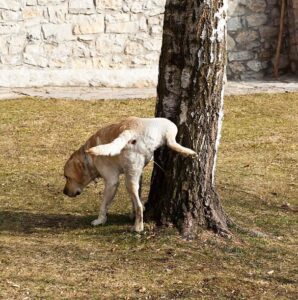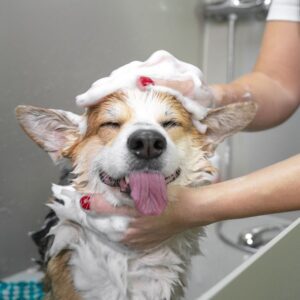Since every dog is different and therefore has different urinary habits, however, in general, it is considered normal for a dog to urinate between three to five times per day.
Therefore, if your dog is only urinating once daily, it might not be within the range of what is considered normal, and you should be concerned.
Dogs are typically able to hold their bladder for one hour per each month of age. Therefore, a two-month-old puppy can generally hold it for about two hours and a three-month-old puppy can hold it for about three hours, and so on.
However, this rule of thumb isn’t always accurate and some dogs may need to urinate more or less frequently than others depending on various factors such as health, diet, exercise, etc.
So is it normal for a dog to only pee once a day?
It is advised to take your dog to the vet for a checkup if you are concerned about their urinating patterns. The vet can determine if anything is wrong and your dog is healthy.
Why do Dogs Pee?

The urinary system is in charge of eliminating waste from the body by producing urine. The kidneys, which filter blood and eliminate extra water and other waste products from the body, create urine.
The urethra, a tube that connects the bladder to the exterior of the body, is subsequently used to expel the waste materials.
The filtered blood then returns to the body through the renal veins. The renal arteries carry blood to the kidneys, and the renal veins carry blood away from the kidneys.
Urine travels from the kidneys to the bladder through tubes called ureters. Urine is kept in the bladder until it is time to be expelled.
The process of urination occurs when bladder muscles contract and urine is forced out of the body through the urethra.
Factors that Affect how often a Dog Pees:

Age:
A young dog’s bladder is not fully developed and thus cannot hold as much urine as an adult dog. A puppy may need to urinate as often as every hour, whereas an adult dog can usually hold it for several hours.
Size:
Smaller dogs have smaller bladders and thus need to urinate more frequently than larger dogs.
Diet:
Dogs that eat a lot of water-rich food (such as canned or wet food) will produce more urine than those on a dry food diet. Similarly, dogs that drink a lot of water will also produce more urine than those that don’t drink as much water.
Activity level:
Very active dogs (such as working dogs or those that exercise frequently) will need to urinate more often than sedentary dogs because they lose more water through panting and sweating.
Is it Normal for a Dog to Only Pee Once a Day?
No, it is not normal for a dog to only pee once a day. While many factors can affect how often a dog needs to urinate, the average healthy dog will need to relieve himself at least 3-5 times per day.
You should consult your veterinarian if your dog only urinates once daily since this could indicate a severe health issue.
The frequency of a dog’s urination might vary depending on several things. Age, size, diet, and activity level affect how much urine a dog produces and how often he needs to relieve himself.
For example, younger dogs generally have smaller bladders and need to urinate more frequently than older dogs.
Larger dogs also produce more urine than smaller dogs and may need to go more often.
Dogs with higher levels of protein or who drink more water could also need to go potty more frequently than canines with lower levels of protein or who drink less water.
Finally, very active dogs may also need to relieve themselves more often than those who are less active.
While many factors can affect how often a dog needs to urinate, the average healthy dog will need to relieve himself at least 3-5 times per day.
If your dog only urates once daily, it could indicate an underlying health condition, and you should speak to your veterinarian.
Some possible health conditions that could cause your dog only to urinate once a day include:
- Urinary tract infection (UTI) – A UTI can cause your bladder to become inflamed and make it difficult or painful for him to urinate frequently.
- Kidney disease – Kidney disease can cause your dog’s kidneys to produce less urine than usual. As kidney function declines, your dog may only need to urinate once a day or even less frequently.
- Diabetes mellitus – Diabetes mellitus is another condition that can lead to decreased urine production and may cause your dog to only urinate twice a week or even less frequently.
- Cushing’s disease – Cushing’s disease is a condition that causes the body to produce too much of the hormone cortisol. One of the many signs of Cushing’s disease is increased urination.
If your dog is only urinating once daily, it is essential to consult your veterinarian to rule out any underlying health conditions.
How Often Should Dogs Pee Per Day?

On average, most dogs must urinate thrice to five times a day. This number will differ based on the individual dog’s age, size, diet, and activity level (which we’ll discuss in more detail later).
Some smaller breeds of dogs may only need to go once or twice a day, while larger breeds may need to go up to eight times or more.
There are several things to note regarding your dog’s urination habits.
- Make sure your dog has access to enough fresh water at all times before anything else. One ounce of water per pound of body weight daily is a decent guideline. If your dog is particularly active, you may need to increase this.
- Secondly, keep an eye on your dog’s stools. If they are hard and dry, this could be a sign that your dog is not drinking enough water. Conversely, if they are soft or runny, this could be a sign of diarrhea, and you should consult your veterinarian.
- Finally, pay attention to where your dog is urinating. If they go inside the house more frequently than usual, this could signify something is wrong. We’ll discuss this more in the next section.
How can you Make your Dog Pee More Often?
You can urge your dog to urinate more frequently in several ways:
- Take them on more walks. This will allow them to relieve themselves more often.
- Give them plenty of access to water. Please encourage them to drink regularly throughout the day by placing water bowls around the house.
- Feed them a high-quality diet that is rich in moisture. This will help keep their urinary tract healthy and prevent UTIs.
- If your dog is resistant to walking, try playing fetch or other active games to get them moving around and increase their urge to pee.
- If you think there may be an underlying health issue causing your dog to urinate less frequently, talk to your veterinarian about possible solutions.
When to Worry about your Dog’s Peeing Habits?
Lower Quantity of Urine
If you notice that your dog produces a significantly smaller amount of urine than usual, this could cause concern. Several things could be causing this, such as dehydration or a urinary blockage.
Take your dog to the vet immediately if he exhibits other signs of illness, such as lethargy or vomiting.
Straining to pee
If your dog seems to be straining to urinate or taking a long time to urinate, this could also indicate a problem. This could be caused by an obstruction in the urinary tract, which is a medical emergency.
Other causes of straining to urinate include arthritis and nerve damage. If your dog is straining to urinate, take him to the vet immediately.
Blood in the urine
If you notice blood in your dog’s urine, this is cause for concern and warrants a trip to the vet.
Blood in the urine can indicate several problems, such as a urinary tract infection or kidney disease. Getting your dog checked out by a professional must treat the underlying cause adequately is essential.
Going more than 24 hours without peeing
If your dog goes more than 24 hours without urinating, you should be worried about this, and you should take him to the vet immediately. This could indicate a severe problem such as renal failure or diabetes mellitus.
Urinating less than usual:
Suppose your dog is urinating less than usual. In that case, this could be due to dehydration, which can be caused by various factors such as heat exposure, prolonged exercise, or not drinking enough water.
If your dog is dehydrated, you should immediately take him to the vet as he may need IV fluids.
FAQs:
Q: How can you tell if your dog has a urinary infection?
A: If your dog is peeing more frequently than usual, straining to urinate, or producing small amounts of urine, he may have a urinary infection. Other signs include blood in the urine or foul-smelling urine. If your dog has a urinary infection, take him to the vet for treatment.
Q: How long should a dog go without peeing?
A: A healthy adult dog should be able to hold his bladder for up to 8 hours. Puppies and elderly dogs may need to urinate more frequently. If your dog goes more than 8 hours without urinating, he may be dehydrated or have a medical problem that needs to be treated by a veterinarian.
Q: What happens if a dog holds his pee too long?
A: Holding urine in for too long can lead to urinary tract infections or kidney stones. It can also cause pain and discomfort. If your dog holds his urine for more than 8 hours, take him to the vet to rule out any medical problems.
Q: What food causes UTI in dogs?
A: There is no definitive answer, but some experts believe certain foods may contribute to UTIs in dogs. These include foods high in sugar or salt, processed foods, and fatty foods. Feeding your dog a balanced diet and avoiding these foods may help reduce his risk of developing a UTI.
Q: What can cause difficulty urinating?
A: Urinary blockages are one of the dogs’ most common causes of difficulty urinating. Other causes include kidney disease, diabetes, and certain medications (such as diuretics). If your dog is having difficulty urinating, take him to the vet so that the cause can be diagnosed and treated appropriately.




